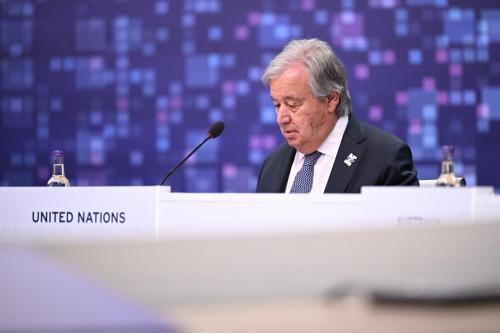Editor’s Note: This blog is written as part of the 2014 Brookings Blum Roundtable, an annual event where experts discuss big ideas to tackle development challenges in the world’s most impoverished states. The Roundtable’s new post-conference report
and other materials can be found at
brookings-edu-2023.go-vip.net/bbr
.
Just a few years ago, it would have been very uncommon to find an official from the U.S. Agency for International Development (USAID) or any other development organization sitting in the New York offices of a multi-billion dollar private equity firm brainstorming ideas of how the U.S. government and the private sector could work together to bring electricity to millions of people. Of course, USAID and other international organizations and NGOs have spent years trying to court companies and to tap into corporate social responsibility budgets to support development efforts across the globe.
Initially, many people were merely content when a mining company or garment factory built a school in the local community in which it was operating. Then, development experts worked with companies where their profit-making goals overlapped with USAID development goals to invest in training teachers or creating business centers where community members could learn new skills and get access to financing.
But today, the worlds of finance and development have merged in an unprecedented way. As showcased during the U.S.-hosted African Leaders Summit in August 2014, President Obama’s Power Africa initiative has attracted more than $20 billion in private sector commitments to light up sub-Saharan Africa, a commitment that will create millions of jobs in the U.S. and abroad as well as help lift entire nations out of poverty. Business leaders sat side-by-side with development leaders.
Energy is one of the key constraints to economic growth in Africa, and only the private sector has the sufficient resources to build the necessary infrastructure. And private companies—banks, solar lantern companies, gas turbine manufacturers, smart meter producers, pension funds, and private equity firms—need to work with development organizations and host government partners in smart ways to mitigate the many risks associated with energy projects if deals are to stay on track.
Power Africa serves as a prime example of how many partners, including 12 U.S. government agencies, the World Bank Group, the African Development Bank, the government of Sweden, the African Union Commission, and the United Nations, along with our partner governments, can come together to pool resources and tools and to align goals and efforts to drive private sector investment. The Power Africa team regularly meets in New York, Stockholm, London, Dubai, Johannesburg, Lagos, Nairobi and elsewhere with institutional investors who collectively have trillions of dollars of assets under management. We discuss how their investments will drive economic growth in the places that need it the most.
Our African partners are now looking less for the high-priced expert, who comes into a country to opine on what reforms a country may need to drive development. Rather, they want the deals themselves to drive the development.
Local politicians know that if they want to break ground on projects and flip switches, which will win them voters, they need to make the tough reforms that will attract investment. Financing firms know that they are competing for a limited number of “bankable” deals in sub-Saharan Africa, and they must roll up their sleeves and work outside of their comfort zone if they do not want to miss out. Institutional investors worldwide are turning to frontier markets for higher rates of return than what they are earning on their European investments. Development officials are striving to show how the taxpayer money they are trusted to spend helps people in an immediate and measurable way.
In the coming year, development officials and private financiers will spend even more time together as the appetite for new infrastructure investments in frontier markets expands. An area to watch closely is how the many risks associated with infrastructure deals might be reallocated in new and innovative ways to move deals forward. We may see the private sector developing insurance products to mitigate risks associated with new sectors and new markets such as geothermal drilling in East Africa. Donors may start to seed development capital funds to de-risk deals at the earliest stages so that more deals can become bankable more quickly.
The role that development institutions play in driving infrastructure development is being redefined, and the Power Africa partners are excited to be driving this new model for development.



Commentary
Harnessing the Power of the Private Sector to Transform Our Development Efforts
January 9, 2015